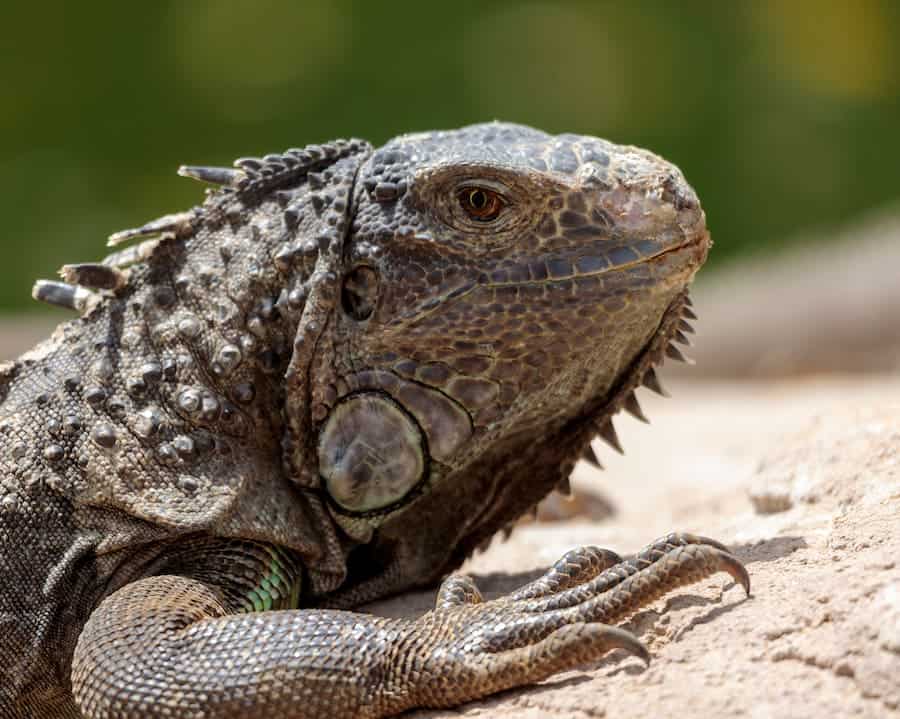Do you want to own an iguana as a pet but are worried that it might not live a long time? Owning an iguana is fun because they have long lifespans.
As a general rule, iguanas can live to be 10 – 69 years old. However, the lifespan will depend on the type of iguana you have, living conditions, and how well you take care of them.
In the guide below, we discuss how long iguanas live, how to increase their lifespan and factors that can impact life expectancy.
How Long Do Iguanas Live?
One big advantage of having an iguana as a pet is that they live for a relatively long time. But how long do they live, exactly, and what about wild iguanas?
Pet Iguanas
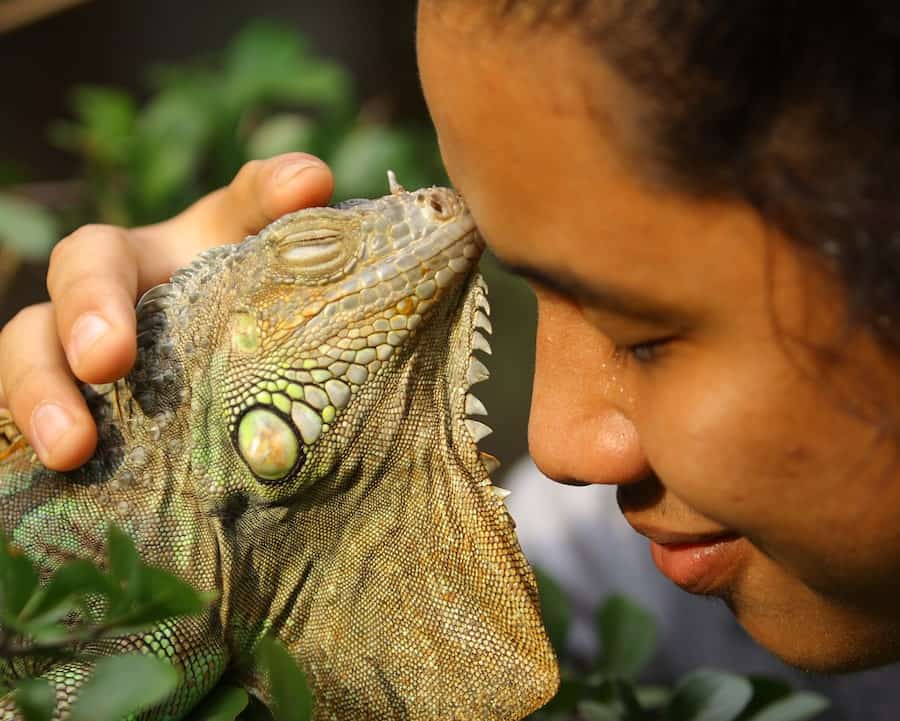
With proper care, a tropical pet iguana can live 15+ years. When I say tropical iguanas, I’m referring to:
- Green iguanas
- Red iguanas
- Blue iguanas
The blue iguana is one of the longest-living species in captivity. In fact, there is a record of one male blue iguana living to be at least 69 years old.
Desert iguanas can live 10-14 years as pets with the right care.
In general, iguanas live for quite a long time in captivity due to a lack of predators and a lower risk of illness.
Feral Iguanas

Feral, or wild, iguanas also have long lifespans. Wild iguanas, especially green iguanas, can live up to 20 years.
Some species, like the Grand Cayman Blue Iguana, can survive up to 40 years in the wild.
Factors That Can Limit an Iguana’s Lifespan

It’s important to remember that iguanas which live to be 15-20+ years old as pets are the ones that receive proper care.
There are many factors which can limit your pet’s lifespan. If you’re considering an iguana as a pet, it’s important to know these factors so that you can make every effort to keep your pet as happy and healthy as possible.
Improper Lighting
Iguanas need about 12 hours of sunlight per day. Pet owners often rely on a combination of natural sunlight and artificial UV lighting to ensure their pets are getting all the sun exposure they need.
Improper lighting, however, can shorten your iguana’s lifespan and lead to several issues, primarily metabolic bone disease.
Iguanas need ultraviolet light to absorb calcium, a critical nutrient for these reptiles. Calcium helps maintain strong bones, muscle contractions, and plays an important role in many other body functions.
An imbalance of calcium and phosphorous can lead to metabolic bone disease, which is often fatal.
Improper Diet
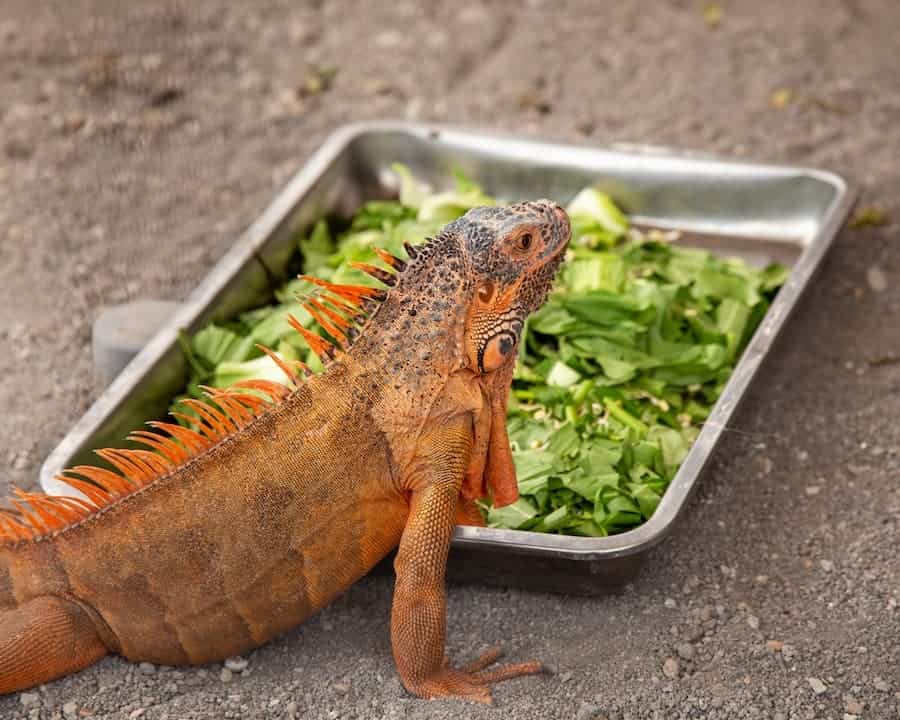
Just like us humans, an iguana’s diet has a big impact on its health. It’s our responsibility as iguana owners to ensure that we’re feeding our pets the right mix of foods to meet their nutritional needs.
An imbalance of nutrients can shorten an iguana’s lifespan significantly.
- Too much protein, particularly animal protein, can cause gout, urinary bladder stones, the mineralization of tissues and other health issues.
- Feeding too many vegetables that are high in oxalates (such as spinach, kale and other cruciferous vegetables) can reduce the absorption of calcium.
- Not maintaining the right calcium/phosphorus balance can lead to metabolic bone disease and other issues.
Improper diet can not only lead to the development of disease, but it can also weaken your iguana’s bones, making them more susceptible to injury if they fall.
Excessive Heat or Cold
In order to live a long and healthy life, an iguana’s environment needs to be just the right temperature. Maintaining the right balance of heat and humidity is not always an easy task.
Excessive heat or cold can have dire consequences for an iguana.
Sure, these reptiles love the heat, but too muchheat can put their lives at risk. Exposure to temperatures above 100°F for a prolonged period can injure or even kill an iguana.
Iguanas have no way to control their body temperature on their own. When the environment is too hot, they can quickly overheat.
Additionally, unprotected heat lights and hot rocks can also cause thermal burns on iguanas.
On the other hand, excessive cold can also be dangerous for iguanas. What we perceive as warm and comfortable may actually be too cold for your iguana.
Prolonged exposure to cold temperatures can cause:
- A weakened immune system
- Slow movement or complete loss of movement
Keeping an iguana in an environment that is too hot or cold can greatly shorten its lifespan. It’s important to ensure that you have a plan for your enclosure and all the right components to keep your pet’s space at the right temperature.
Parasites

Parasites and bugs can also shorten an iguana’s lifespan. They can cause disease and other medical issues.
Iguanas can get a variety of worms, including roundworms, pinworms and tapeworms. Along with feeding on their blood, worms can cause impaction in the intestines and steal nutrients from your lizard.
Some worms can spread rapidly, causing illness and even death in some cases. Unfortunately, intestinal parasites are common in iguanas
Along with worms, iguanas can also be affected by bugs, including:
- Ticks, which deplete the lizard’s blood supply and carry disease. Ticks can be a source of stress for iguanas and may lead to fatigue.
- Mites, which can also deplete your lizard’s blood and infect them with disease.
Parasites and bugs can cause a number of health issues, including diarrhea and weight loss. Mites can sometimes be fatal if they are not caught and eradicated in time.
Predators

Unless you live in a zoo, the typical iguana predator shouldn’t be in your home. Natural predators include:
- Owls
- Snakes
- Hawks
Some people even eat iguanas. However, if your pet is indoors, you only need to be concerned about your other animals. Feral cats and dogs are known to kill iguanas, too.
In packs, dogs tend to be even more of a threat to iguanas.
You can take steps to keep your other pets away from your iguana, such as never allowing them in the same room together. Years ago, many dogs in Miami were dying because iguana skin was causing botulism poisoning.
In general, you want to keep these pets separate and reduce the risk of harm to all parties involved.
Tips to Increase Your Pet Iguana’s Life
In my recent post which you can read by clicking the link and is titled, “Cost of Owning an Iguana in 2022 & How to Save,” I cover a lot of great points that can extend the lifespan of your reptile. You can achieve this goal through:
Vet Visits
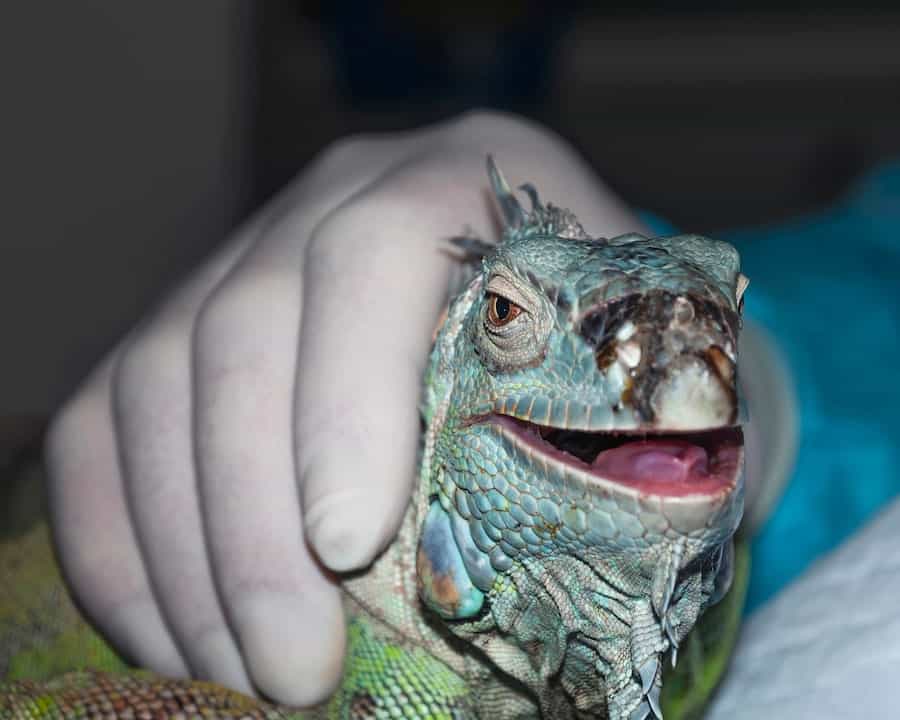
If your iguana is acting normal, you may be tempted to skimp on going to the vet. However, this is a big mistake because a vet visit can find issues that you may overlook, such as:
- Infections
- Parasites
- Dehydration
- Immune system issues
- More
A vet can even help you determine if your pet is stressed. Most owners find the $200 a year in vet bills is a worthwhile investment in keeping their iguanas in good health.
If you’re not sure how to tell if your iguana is stressed, check out this post I wrote titled, “15 Signs an Iguana is Stressed & What to do About it.”
Proper Diet

According to James Hatfield, iguana expert and author of “Green Iguana The Ultimate Owner’s Manual,” the proper diet for an iguana includes:
- Leafy greens 40%
- Other vegetables 30-40%
- Fruits 10-15%
- Grains 0-4%
- Supplemental protein 1-3%
Maintaining a proper diet is crucial to your pet’s lifespan. I recommend that you also consult with your vet during your visits to ensure that you’re providing enough nutrients in the right proportions.
Large Enclosure for Plenty of Exercise
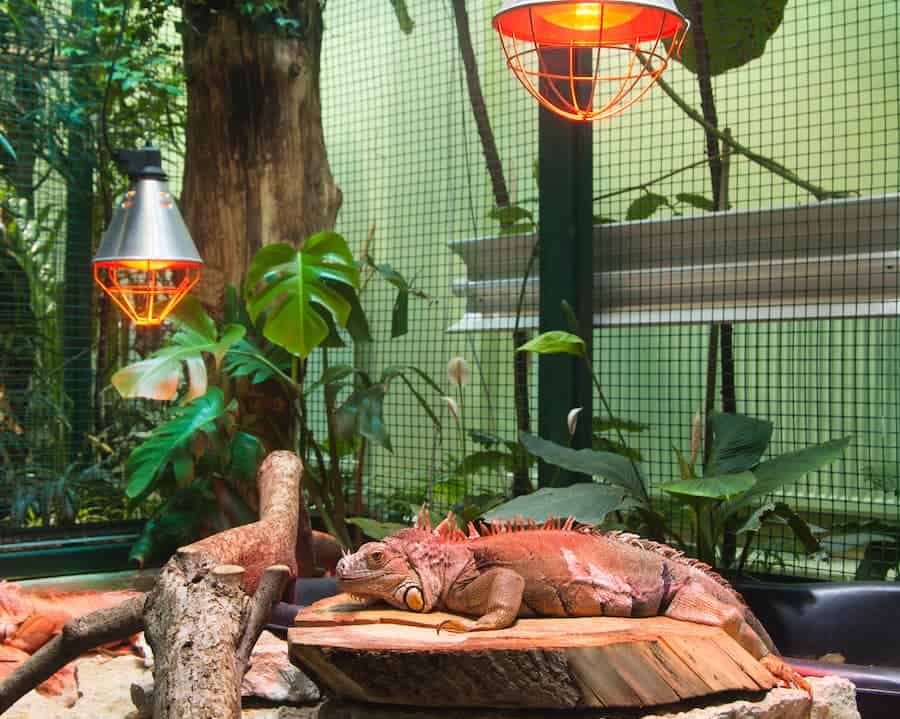
Iguanas need space to grow, thrive and exercise. A large enclosure will provide your reptile with all of these benefits.
You may start with a small enclosure for a young iguana, but adults will need one that is:
- 8’L x 8’H x 3-4′ D
If you provide a large enclosure, your pet will be happier and healthier as a result. You’ll also need to fill the enclosure with iguana-friendly items, such as substrate and branches.
On another note, it’s important to clean the enclosure often. A dirty enclosure can lead to bacteria growth, health risks and a very unhappy iguana.
Supplements
Iguanas need a balanced diet and the right mix of nutrients to feel their best. Two of the supplements that are worth considering are:
Fluker’s Calcium Reptile Supplement with added Vitamin D3
Calcium is an integral vitamin that is worth the $5 (it’s actually cheaper) because it’s crucial for the health of your lizard, particularly bone health. Plus, it has D3 added into it for pets that don’t get out in the sun much.
Nekton Vitamin and Development Compound for Green Iguanas
If you’re new to owning iguanas and aren’t sure if you’re meeting the proper diet guidelines above, this supplement from Nekton is rated very well and filled with:
- Protein
- Vitamin A
- Sodium phosphate
- Riboflavin
- B2
- Calcium
- So much more
Guidelines are provided for iguanas of all ages to ensure your reptile has the nutrients it needs to grow and stay healthy.
Using the tips above, you can help your iguana live the longest, best life possible. Owning a reptile is a commitment, but it’s worth the effort to keep your iguana happy, healthy and strong.

